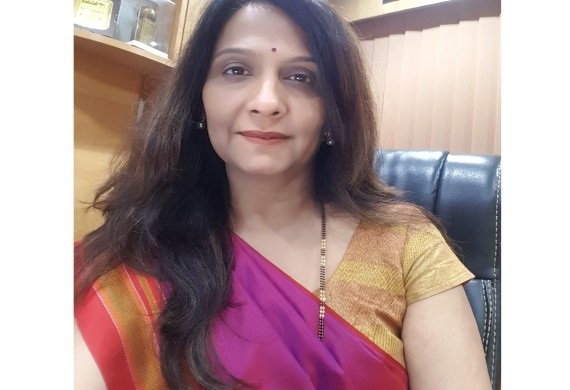
Women Entrepreneur in Agriculture- Opportunities & Challenges SandeepaKanitkar,Founder, Chairperson & Managing Director,
By: WE Staff | Thursday, 18 March 2021
With a professional experience of more than three decades, Mrs.SandeepaKanitkar is the Founder Chairperson and Managing Director of KanBiosys. An industrial microbiologist who has spent 30 years unleashing the power of microbes for agriculture. Starting from the first patent for producing liquid biofertilizers which won the United Nations WIPO Gold Medal she is involved in improving the efficiency of fertilizers and pesticides using microbes.
Entrepreneurship is gender agnostic. It is about seeing opportunities when others see problems. An entrepreneur always sees solutions in the problem and tries to reach these solutions in form of products or services to society. It is all about taking risks as the drive to realize the dream supersedes the risk. She/he dreams, innovates, motivates, overcomes obstacles, fails but still gets up to try different things until he/she succeeds. The idea of the product/service journey is full of risks and rewards. But the main aspect in all this is the people she/he selects, motivates, and empowers them to go after the vision or dream against all odds.
Having done my post-graduation in industrial microbiology I decided to pursue my studies abroad. I also had a good GATE score to get admission to MTech at IIT’s but luck had something else in store for me. By chance, I met a scientist Prof U K Kanitkar – a crop physiologist who was working on microbes useful for agriculture. He motivated me to work with him and emphasized the need to innovate in areas where there was an urgent need. He said he would be happy only if I create something where technology is needed from the grassroots as against working on incremental technologies.
This made me opt out of pursuing my further studies and I started working with him in a modest lab. He passed away in a year leaving me to handle his entire culture collection of 2000 microbes which he had isolated from the soils across India. Thus my journey began. We brought together a team of 6 people who toiled with us in a decent infrastructure to make things happen.
After working for almost 2 years our team came out with a liquid biofertilizer for which we got the first Indian patent. This technology was awarded the First Technology day award by the ministry of science and technology and subsequently won the WIPO award. “Sustainability” was not a very popular word in India then and the era was of chemical fertilizers and pesticides. Soil health, climate change was not market-oriented topics of interest. So naturally, we resorted to exports to developed countries where the awareness and aspect of food/ environmental safety were high. Besides chemical fertilizers in India were subsidized and we could not give an answer to why the farmers should buy our fertilizers that are not subsidized!
Grape and pomegranate exports were rising and the issue of pesticide residues came up. Many consignments of farmers were getting rejected at customs due to food safety norms in developed countries. Our research had previously led us to many microbes which could be used to manage the plant pathogenic fungi and insects. Thus we were amongst the first to formulate bio-fungicides and bio-insecticides using antagonistic fungi/bacteria. This expanded our farmer user base in horticultural and vegetable markets. Still, the bulk of the farmers who in fact really needed our biofertilizers, biopesticides, and soil health management products were ignorant about our products and technologies. The idea then was conceived to work with the seed companies to make them do factory seed dressing with microbial inoculants as to reach marginal/ small farmers was an uphill task. This yielded good results but we still have to make sufficient progress with it.
There was the problem of rice stubble burning in north India which caused smog over Delhi in October. The burning was also the root cause of degrading soil fertility and was causing draining groundwater out of Punjab and Haryana which were the best-irrigated states in India. The health hazards were also increasing as much of the water was being polluted by nitrates from fertilizers. The hands of the farmers were also tied as there was no solution to utilizing rice straw within 15 days before wheat sowing. We launched a technology to sequester the valuable carbon in rice straw and gave an option for burning. We also wish to in future launch a program for carbon credits for farmers. This will be a landmark activity that will bring farming closer to the consumers and also the industry.
We created good extension models of aligning our microbial products with the routine package of practices of chemical fertilizers and pesticides. This promoted the use of microbial products as the drivers of increasing consumer awareness about food safety and environmental impact.
Presently our team of over 150 people produces half a million liters/kg of microbial products which are sold in 7 states of India through a network of around 1500 dealers. We also export our products to over 4 countries. All our products can be used for conventional as well as for organic farming. We have a DSIR recognized R and D laboratory which works on SMART BIOPLATFORM for bringing the NEXT GEN microbial products for sustainable farming. We wish to be a pan India company in the next 3 years and have a considerable offshore presence as well. In India, we are keen to supply quality formulations to multinational and national agrochemical, fertilizer and seed companies as we believe microbial products can add value to each and every granule of fertilizer and seed.






